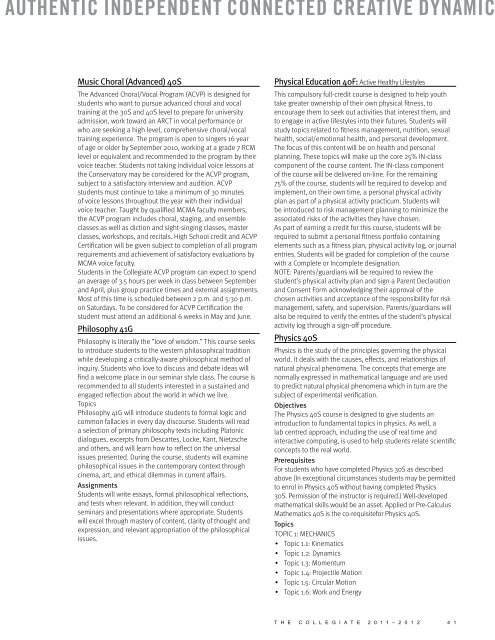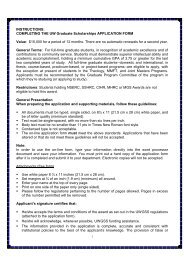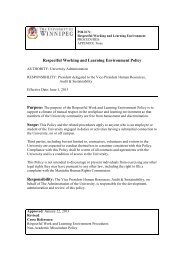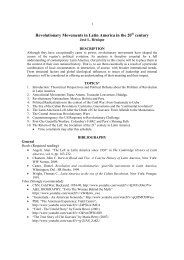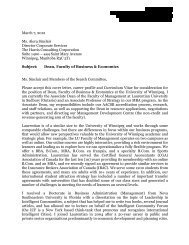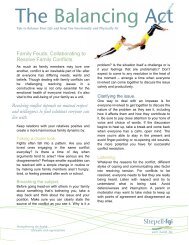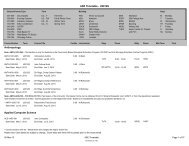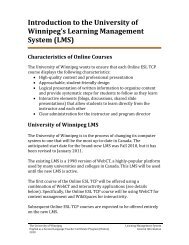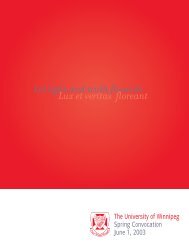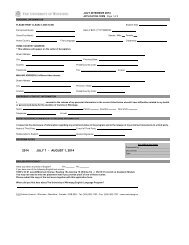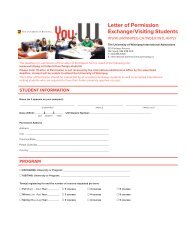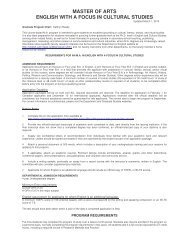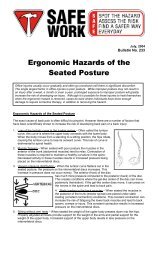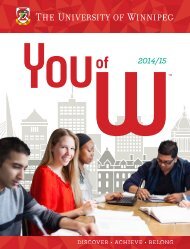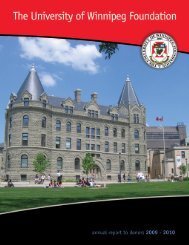2011â2012 Calendar - University of Winnipeg
2011â2012 Calendar - University of Winnipeg
2011â2012 Calendar - University of Winnipeg
You also want an ePaper? Increase the reach of your titles
YUMPU automatically turns print PDFs into web optimized ePapers that Google loves.
AUTHENTIC INDEPENDENT CONNECTED CREATIVE DYNAMIC<br />
Music Choral (Advanced) 40S<br />
The Advanced Choral/Vocal Program (ACVP) is designed for<br />
students who want to pursue advanced choral and vocal<br />
training at the 30S and 40S level to prepare for university<br />
admission, work toward an ARCT in vocal performance or<br />
who are seeking a high level, comprehensive choral/vocal<br />
training experience. The program is open to singers 16 year<br />
<strong>of</strong> age or older by September 2010, working at a grade 7 RCM<br />
level or equivalent and recommended to the program by their<br />
voice teacher. Students not taking individual voice lessons at<br />
the Conservatory may be considered for the ACVP program,<br />
subject to a satisfactory interview and audition. ACVP<br />
students must continue to take a minimum <strong>of</strong> 30 minutes<br />
<strong>of</strong> voice lessons throughout the year with their individual<br />
voice teacher. Taught by qualified MCMA faculty members,<br />
the ACVP program includes choral, staging, and ensemble<br />
classes as well as diction and sight-singing classes, master<br />
classes, workshops, and recitals. High School credit and ACVP<br />
Certification will be given subject to completion <strong>of</strong> all program<br />
requirements and achievement <strong>of</strong> satisfactory evaluations by<br />
MCMA voice faculty.<br />
Students in the Collegiate ACVP program can expect to spend<br />
an average <strong>of</strong> 3.5 hours per week in class between September<br />
and April, plus group practice times and external assignments.<br />
Most <strong>of</strong> this time is scheduled between 2 p.m. and 5:30 p.m.<br />
on Saturdays. To be considered for ACVP Certification the<br />
student must attend an additional 6 weeks in May and June.<br />
Philosophy 41G<br />
Philosophy is literally the “love <strong>of</strong> wisdom.” This course seeks<br />
to introduce students to the western philosophical tradition<br />
while developing a critically-aware philosophical method <strong>of</strong><br />
inquiry. Students who love to discuss and debate ideas will<br />
find a welcome place in our seminar style class. The course is<br />
recommended to all students interested in a sustained and<br />
engaged reflection about the world in which we live.<br />
Topics<br />
Philosophy 41G will introduce students to formal logic and<br />
common fallacies in every day discourse. Students will read<br />
a selection <strong>of</strong> primary philosophy texts including Platonic<br />
dialogues, excerpts from Descartes, Locke, Kant, Nietzsche<br />
and others, and will learn how to reflect on the universal<br />
issues presented. During the course, students will examine<br />
philosophical issues in the contemporary context through<br />
cinema, art, and ethical dilemmas in current affairs.<br />
Assignments<br />
Students will write essays, formal philosophical reflections,<br />
and tests when relevant. In addition, they will conduct<br />
seminars and presentations where appropriate. Students<br />
will excel through mastery <strong>of</strong> content, clarity <strong>of</strong> thought and<br />
expression, and relevant appropriation <strong>of</strong> the philosophical<br />
issues.<br />
Physical Education 40F: Active Healthy Lifestyles<br />
This compulsory full-credit course is designed to help youth<br />
take greater ownership <strong>of</strong> their own physical fitness, to<br />
encourage them to seek out activities that interest them, and<br />
to engage in active lifestyles into their futures. Students will<br />
study topics related to fitness management, nutrition, sexual<br />
health, social/emotional health, and personal development.<br />
The focus <strong>of</strong> this content will be on health and personal<br />
planning. These topics will make up the core 25% IN-class<br />
component <strong>of</strong> the course content. The IN-class component<br />
<strong>of</strong> the course will be delivered on-line. For the remaining<br />
75% <strong>of</strong> the course, students will be required to develop and<br />
implement, on their own time, a personal physical activity<br />
plan as part <strong>of</strong> a physical activity practicum. Students will<br />
be introduced to risk management planning to minimize the<br />
associated risks <strong>of</strong> the activities they have chosen.<br />
As part <strong>of</strong> earning a credit for this course, students will be<br />
required to submit a personal fitness portfolio containing<br />
elements such as a fitness plan, physical activity log, or journal<br />
entries. Students will be graded for completion <strong>of</strong> the course<br />
with a Complete or Incomplete designation.<br />
NOTE: Parents/guardians will be required to review the<br />
student’s physical activity plan and sign a Parent Declaration<br />
and Consent Form acknowledging their approval <strong>of</strong> the<br />
chosen activities and acceptance <strong>of</strong> the responsibility for risk<br />
management, safety, and supervision. Parents/guardians will<br />
also be required to verify the entries <strong>of</strong> the student’s physical<br />
activity log through a sign-<strong>of</strong>f procedure.<br />
Physics 40S<br />
Physics is the study <strong>of</strong> the principles governing the physical<br />
world. It deals with the causes, effects, and relationships <strong>of</strong><br />
natural physical phenomena. The concepts that emerge are<br />
normally expressed in mathematical language and are used<br />
to predict natural physical phenomena which in turn are the<br />
subject <strong>of</strong> experimental verification.<br />
Objectives<br />
The Physics 40S course is designed to give students an<br />
introduction to fundamental topics in physics. As well, a<br />
lab centred approach, including the use <strong>of</strong> real time and<br />
interactive computing, is used to help students relate scientific<br />
concepts to the real world.<br />
Prerequisites<br />
For students who have completed Physics 30S as described<br />
above (In exceptional circumstances students may be permitted<br />
to enrol in Physics 40S without having completed Physics<br />
30S. Permission <strong>of</strong> the instructor is required.) Well-developed<br />
mathematical skills would be an asset. Applied or Pre-Calculus<br />
Mathematics 40S is the co-requisitefor Physics 40S.<br />
Topics<br />
TOPIC 1: MECHANICS<br />
• Topic 1.1: Kinematics<br />
• Topic 1.2: Dynamics<br />
• Topic 1.3: Momentum<br />
• Topic 1.4: Projectile Motion<br />
• Topic 1.5: Circular Motion<br />
• Topic 1.6: Work and Energy<br />
T H E C O L L E G I A T E 2 0 1 1 – 2 0 1 2 4 1


